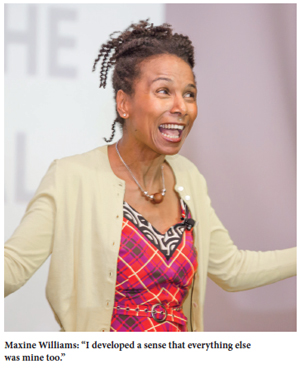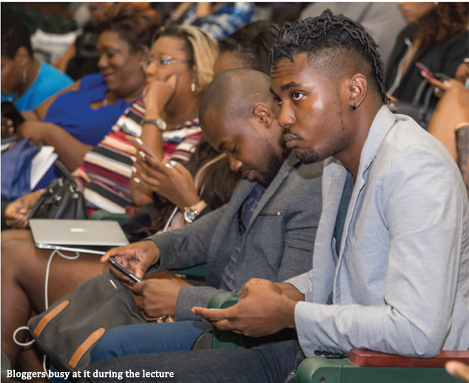
 “I am very much the beneficiary of the sense of belonging that one gets when one is from a very specific small place,” said Maxine Williams, Global Director of Diversity at Facebook. “This concept of community is something we have had the benefit of. We know who we are. There are less variables involved.” “I am very much the beneficiary of the sense of belonging that one gets when one is from a very specific small place,” said Maxine Williams, Global Director of Diversity at Facebook. “This concept of community is something we have had the benefit of. We know who we are. There are less variables involved.”
Williams was the feature speaker at a Distinguished Open Lecture on Social Media and the Creation of Global Communities. The well-attended address was presented on April 10, 2017 at the Teaching and Learning Complex of The UWI, St. Augustine, as an initiative of The Office of Institutional Advancement and Internationalisation.
Speaking in a register that deftly blended formality and informality as well as Standard English and Creole, Williams immediately created a sense of connectedness with her audience and her childhood home, Trinidad.
She shared a personal narrative of having the sense that there was something “beyond” when you looked out past Wrightson Road (beyond the waters of our shores), something that made you wonder about it, but something that ultimately you are entitled to. We have a sense of adhering to these national boundaries that we never set up. Indeed, as a former Rhodes Scholar who has practised law in the UK, been a broadcast journalist and presenter, and has worked on development and human rights issues internationally, Williams has never hesitated to challenge that.
“I developed a sense that everything else was mine too,” she said.
“The sense of community, for me, it was here and it was there (too).”
It is understood that Facebook is all about building communities that enable connections, among them supportive connections, not limited by traditional boundaries of geography, financial constraints or technological divides. Indeed, in some of the cases that Williams shared, knowledge was no longer aspirational yet elusive, but a mere click away.
 There were students using Facebook to form global study groups even where natural disasters or lack of wireless access would typically impede their academic progress. There was one case of a woman in the mountains of Columbia learning to compost by being connected to an agricultural entrepreneur in China through Facebook. In 2014, when there was an outbreak of Zika in Latin America, Facebook provided aggregated data about public conversations around Zika that ultimately enabled UNICEF to strategically reach out to the public. There is a Facebook service called Safety Check which can be accessed if there is a crisis somewhere in the world so that those affected can let their friends and family know, through Facebook, that they are safe. There were students using Facebook to form global study groups even where natural disasters or lack of wireless access would typically impede their academic progress. There was one case of a woman in the mountains of Columbia learning to compost by being connected to an agricultural entrepreneur in China through Facebook. In 2014, when there was an outbreak of Zika in Latin America, Facebook provided aggregated data about public conversations around Zika that ultimately enabled UNICEF to strategically reach out to the public. There is a Facebook service called Safety Check which can be accessed if there is a crisis somewhere in the world so that those affected can let their friends and family know, through Facebook, that they are safe.
Williams said Facebook seeks to think globally and act locally. The global communities created provide a place and a space – a sense of belonging. Indeed, said Williams, someone may be suffering and feeling alone, and where scale is an issue there may be no one around to support, but certainly there are others around the world.
She noted that for every ten people connected to the internet, one is trying to rise out of poverty, and 140 million new jobs could be generated just by enabling such an internet connection. As such, Facebook is promoting a project called internet.org including Free Basics to provide connectivity in traditionally under-serviced areas.
Williams said with Facebook there are no barriers to entry and it is free. Indeed, she said, having a tool like this would be particularly useful, for we recognize that there are things which are beyond us, but which ultimately connect us.
Dara Wilkinson Bobb is a part-time Lecturer in The Writing Centre at the Faculty of Humanities and Education at The UWI, St. Augustine.
|





